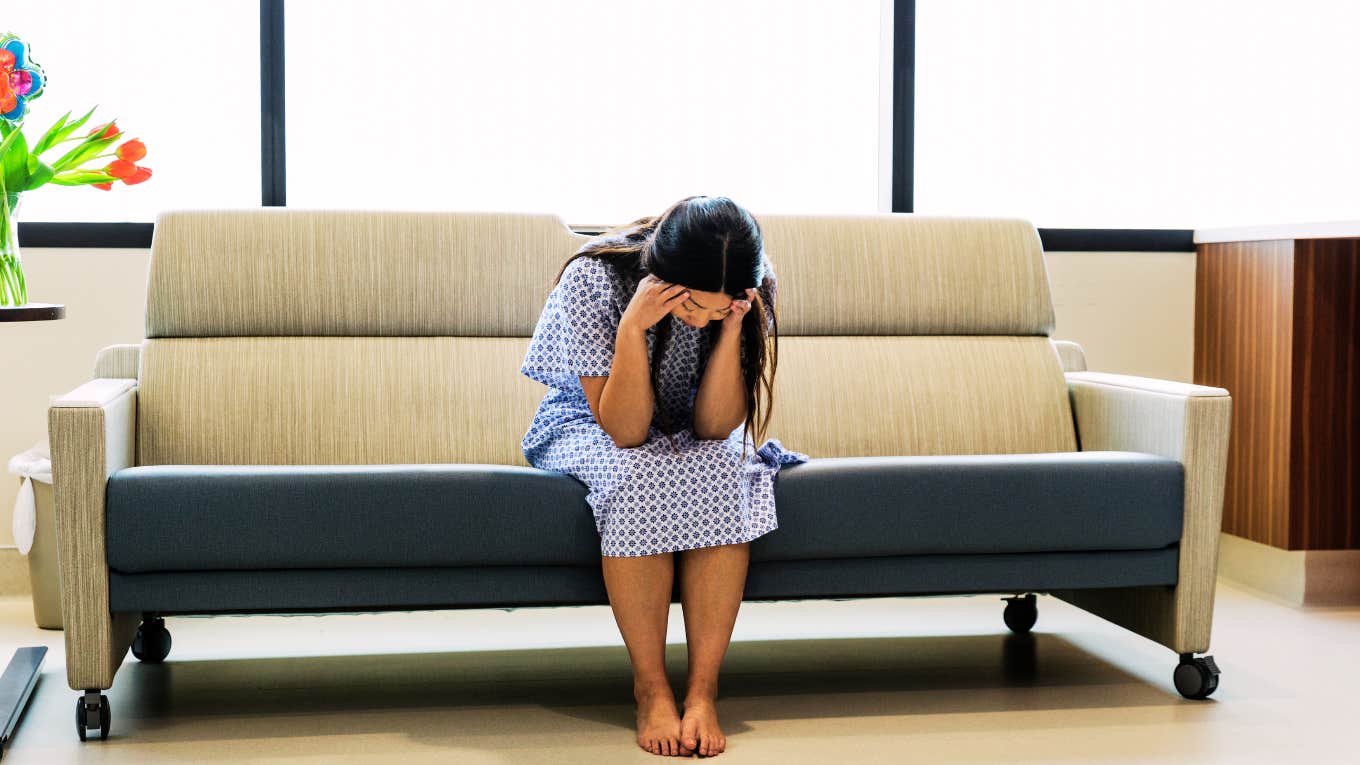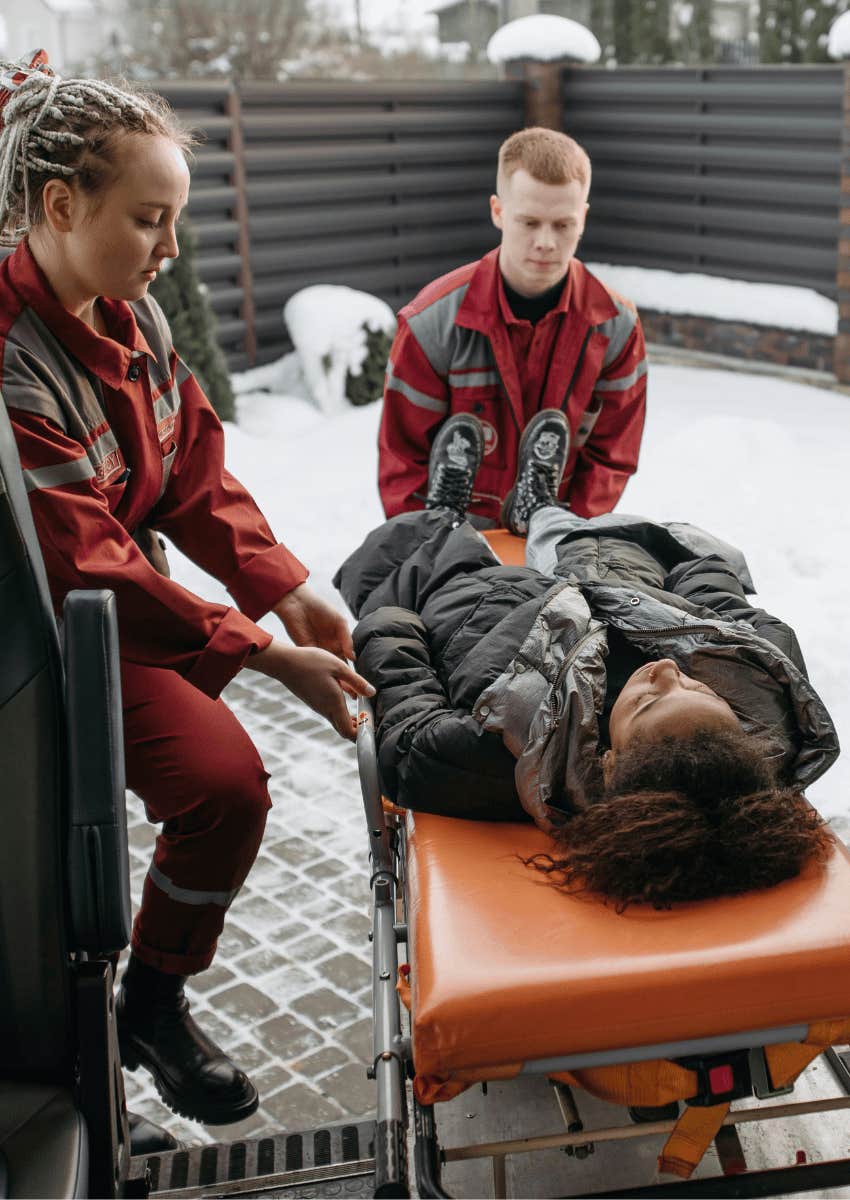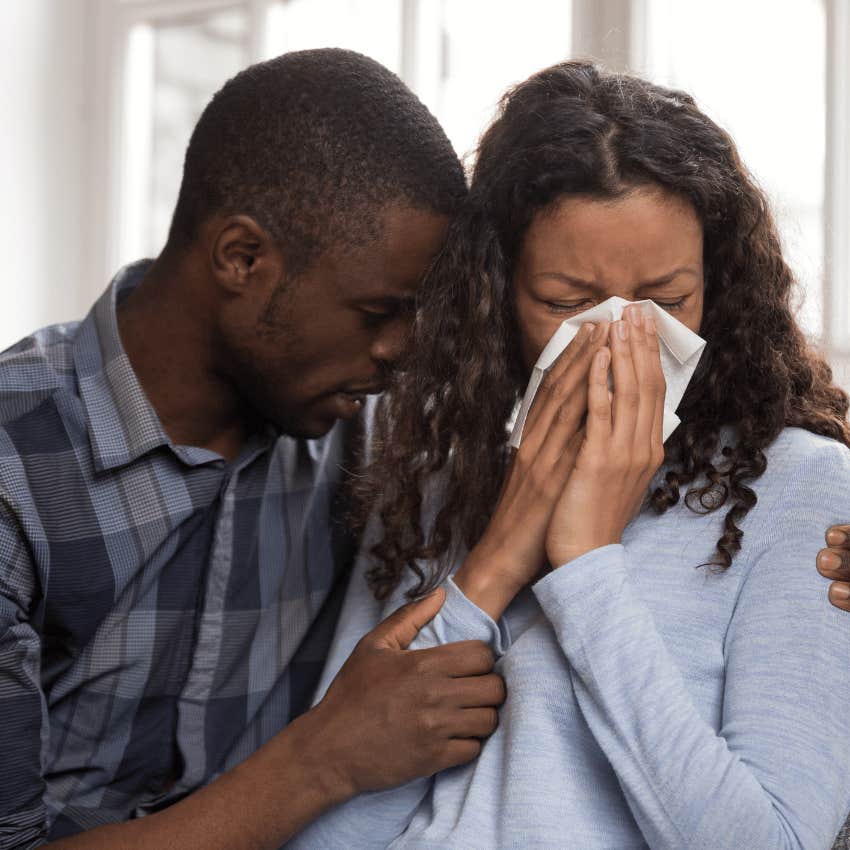An Abortion Saved My Life In Cambodia — 'Without Fast Care, I Knew I Would Die'
How an emergency surgery in another country for an unexpected ectopic pregnancy saved my life.
 SDI Productions | Canva
SDI Productions | Canva Editor's Note: This is a part of YourTango's Opinion section where individual authors can provide varying perspectives for wide-ranging political, social, and personal commentary on issues.
The pain was so bad I bent at the waist, gripping the table. At the front of the room, I told my students, “You are excused. I’m sorry, I’m very sick. I need to leave now.” The Cambodian staff of Hotel InterCon looked worried.
Unbeknownst to me, the ectopic pregnancy in my left fallopian tube put me in serious medical trouble, and without fast care, I would die.
While I usually rode moto-taxis in Phnom Penh, the hotel got me a taxi. Once at my city apartment in Phnom Penh, I crawled up the spiral staircase. I lay on the cold tile floor and phoned Dr. Scott, my British doctor. He heard the terror in my voice. Was I dying? Something was terribly wrong.
My face was chalky white and I was cold and weak. My lower abdomen felt paralyzed with pain. No physical position was comfortable. Polly, my friend, came into the room. I lay on my back staring at the ceiling.
She gasped, “What’s wrong?”
“I don’t know, I don’t know,” I said.
My husband, Ken, slept. As publishers, we kept odd hours. My work was done selling ads and writing copy, and he formatted our new magazine. Awake until 2 a.m., he needed sleep. I wasn’t thinking as I was dizzy from blood loss — at that point, I was close to 20% loss (I found that out after the fact). Time was of the essence. Looking back, I should have woken my husband.
For the last year, we tried to get our publishing company off the ground. We should have moved home to the USA instead of staying there, but Ken begged me to give our publishing company a strong effort. I missed Oregon, my home state, but I loved Ken and we were trying to get pregnant now — finally. That was the carrot he dangled in front of my nose when he wanted to stay in Cambodia.
I lay on the floor and waited for the doctor. Dr. Scott arrived and did a short exam — the rebound test. Funny the things I remember from nearly dying of the first ectopic pregnancy (yes, there were two) all those years ago. Strange details appear like road signs in my memories. Here’s what that test entailed: Dr. Scott pushed firmly into my abdomen. When he quickly moved his hand away, the pain was excruciating.
“Get to a clinic fast,” he said, “and get an ultrasound. You may have either a burst appendix or, wait, could you be pregnant? Maybe you’re having an ectopic pregnancy. Get an ultrasound, then call me. Go right now.”
“K’on Krau S’bone,” said Polly, in Khmer (Cambodian) language, then in French, “Ectopique.” She pointed to the side of her lower abdomen. I already knew what an ectopic pregnancy was, though. I was in serious medical trouble and sensed impending doom.
The ride to the clinic, on the back of a bumpy motorcycle, probably caused the internal bleeding to accelerate.
 Pavel Danilyuk | Pexels
Pavel Danilyuk | Pexels
When I arrived at the Clinique Aurore, a few miles down the road, the staff sat outside eating noodles at a roadside stand. Polly and I begged them to open the clinic and give me an ultrasound. Her dark eyes were wide, and she marched around as if terrified.
“She is having a problem, a big problem!” Polly said, “Maybe an ectopic pregnancy. Bleeding internally maybe.” She helped me, and to this day, I’m grateful she was there. I was so out of it I wasn’t going to ask her to go to the clinic with me. Again, I had lost a liter of blood at this point. That’s 20% of my body’s supply. Later, when I researched the symptoms of that quantity of loss, I recognized the symptoms.
Confused, yes. Cold, yes. Pounding heart. I wasn’t thinking well — and the pain didn’t help. My torso was a strange wall of pain, and a sense of impending doom weighed me down. I had no doubt, in all of my being, I was in mortal danger.
I needed a fast decision and a fast surgery. The ultrasound tech ran the wand over my abdomen.
The machine was dusty. The room was small.
“Oh, not good,” she said, “You are bleeding as high as your liver. A liter.”
“You must have surgery now,” she said, “or you die.”
Cut. Surgery. A’lou ni. Now. S’laap. (or) Dead.
Polly raced back to the house to get Ken, my husband. I stalled the surgery, explaining I needed my husband. I declined blood transfusions: they were not screening blood for HIV or Hep C, and I wanted neither. The medical staff buzzed around me like angry bees, droning“Surgery now, surgery now,” but I waited calmly.
I lay on the gurney, breathing and in a catatonic position of no movement. I willed myself to live. My brother died in 1979 — my parents could not handle my death too.
Within fifteen minutes, Polly and Ken were by my side. Things happened very fast. Even now, I’m grateful. Not a minute was lost. A surgical team was quickly assembled. Dr. Scott came back, a Khmer surgeon, his anesthesiologist, and a nurse. I felt relieved and knew there was no more time to wait.
The internal bleeding needed to be stopped, or I would die. I wanted to stand up, to walk up the steep, nearly vertical stairs to the surgical theater upstairs.
“No,” they all said, “You can not walk.” I began to cry at this point. I was 37 years old, and I was at such risk of dying I couldn’t walk up a steep flight of stairs. To be carried upstairs terrified me. I remember thinking, “I must not cry, I must not sob, I must not exert force.”
Dr. Scott said, “I’m right here,” and held my hand somehow, as they carried me up the tiled stairs. If you’ve ever been in Southeast Asia, you know those kind of stairs.
Surgery anywhere in the world is stressful; surgery in a developing country is completely beyond the pale.
 Stokkete | Shutterstock
Stokkete | Shutterstock
In my surgical room was a dusty cabinet, with a mirror. While my body was draped, it was in this mirror that I began to observe the procedure, which I will not detail. I can’t think about it.
I will say this: any woman who has an ectopic pregnancy is at risk of dying. Ectopic pregnancies are the leading cause of death for first-trimester pregnancies. This information is common knowledge in the USA, but the problem is that women often don’t know they’re pregnant. In my situation, I lived — at the time — in Cambodia.
And I didn’t even know I was pregnant! I was — at most — three months pregnant, and had no idea. Women’s cycles aren’t always predictable. At 37, my cycles were hit-and-miss. I lived in a tropical climate and worked outside a lot of the time. I was under stress. Also, ectopic pregnancies present differently. Women’s bodies react differently to that type of miscarriage.
Without an excellent doctor who made a well-informed diagnostic guess, I would be in deep trouble, most likely dead. I didn’t know of a good hospital or clinic in Cambodia — Dr. Scott gave me information about where to go.
So many what-ifs: What if my cell phone was dead? I had no landline. What if I simply took Advil and went to sleep on my cool apartment floor? I would not have lasted much longer, by the way.
I survived the surgery, but I lost my left fallopian tube. If you are interested in knowing the details of a truly horrific time in my life, I’ve written about it a lot. It’s one of my essential life stories. A happenstance that changed me, formed me, and impacted me. I learned a lot about myself.
And sadly, in 2000, it happened again. That time, I was smarter and on guard. I got myself to Bangkok, where medical facilities are excellent. I was ready for another tubal pregnancy, watching for signs. When I began feeling pain and passing bright blood, I got on a plane and flew myself to a safer place. It wasn’t easy then either.
But that abortion — a termination, a surgery, call it what you will! — also saved my life.
 fizkes | Shutterstock
fizkes | Shutterstock
The Heritage Center wrote an essay about surgeries for ruptured ectopic pregnancies. Those surgeries, they argued, are not abortions. I resent that the Heritage Center attempts to make a distinction between “appropriate” and “inappropriate” abortions.
I’ve given this a lot of thought the last few days, and without playing word games, my surgeries for two ectopic pregnancies were abortions. And they saved my life. I was pregnant; surgeons removed the fetus and my tubes — and I’m so grateful.
That essay on ectopic pregnancies and abortion makes me shake my head in anger. The second key takeaway is this: “Doctors are fully aware that an ectopic pregnancy is not an abortion, and state law has similarly recognized it.”
Here’s the problem with that statement: first, I believe the author meant to say that treatment for an ectopic pregnancy is not an abortion. The article is full of such errors.
Who cares what it’s called? An abortion, a life-saving surgery, a dilation, and a curettage? It doesn’t matter. When I went to two medical facilities, I was sure I was in serious medical trouble. I wanted to live!
When a woman appears at a hospital in dire straits — in pain, perhaps bleeding, apparently in distress — hospital staff may not recognize a pregnancy as ectopic. But to the point — any miscarriage or situation that compromises a woman’s life needs to be addressed immediately. Time is of the essence.
I claim (and am grateful for) my life-saving abortions. They were pregnancies, I received surgery and treatment to remove them. For that, I will be forever grateful.
Women’s lives depend on procedures such as abortion, and assistance with all types of miscarriages. I write and share my story in defense and memory of all women who have suffered so deeply. Many of them have died. To not realize that abortion is part of caring for women, and saving their lives, is reprehensible.
I would give anything to have those babies. Every year, I think of how old my offspring would be. I miss them. I’ve cried and grieved for half of my life for babies I could not have. I’ve had years of crushing grief as I needed to terminate those pregnancies, although, at the time, the surgeons were very clear — the fetus could not exist outside my womb. I would die if I didn’t have surgery. I’m glad beyond belief I lived to write this story.
Debra Groves Harman is a creative non-fiction memoirist who's been published in myriad magazines.

